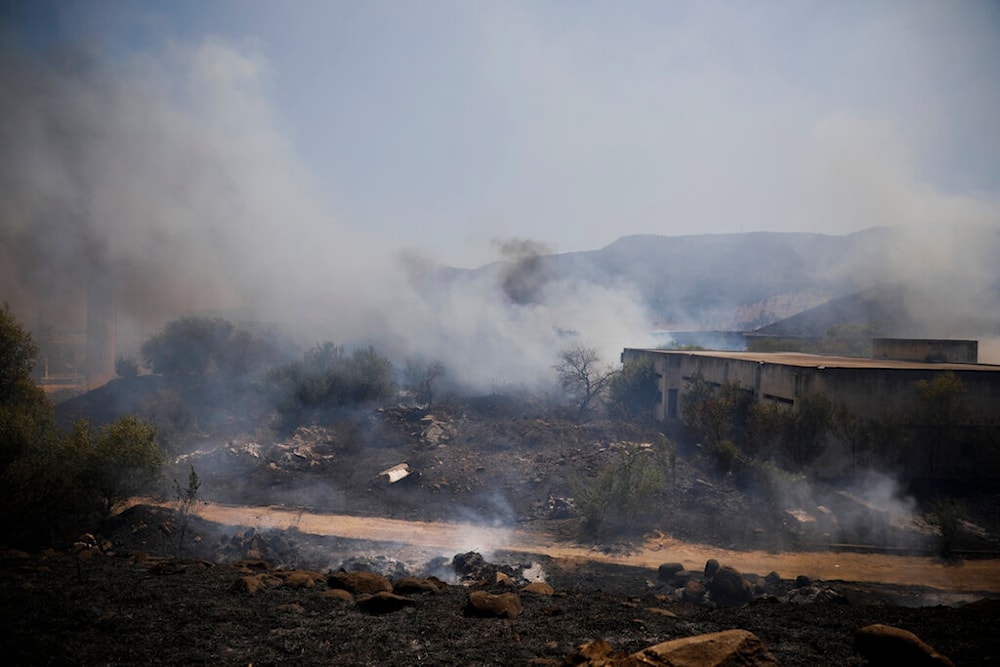North settlements' economy to worsen amid risk of war with Hezbollah
Israeli media has revealed that northern settlements have economically suffered more than southern ones, are threatened with regression as the situation on the northern front gets riskier.
-

Fields burn following a hit by a rocket fired from Lebanon near the northern settlement of "Kiryat Shmona", Wednesday, Aug. 4, 2021 (AP)
Israeli media revealed on Sunday that businesses have been more damaged in northern settlements than in the southern ones.
The Israeli Channel 7 website explained that business transactions and activities have been drastically hit, causing expenditures to exponentially drop by over 75% in "Kiryat Shmona" and "Shlomi" over the 16th week of the Israeli war on Gaza (January 21-27), according to data obtained by Sheba, a company that directs the credit card payment system.
At the same time, data collected from credit card activity also showed that occupied Tabarraya and "Eilat" are economically suffering, with expenditures decreasing by 20% initially, then 32% right after, compared to the pre-war average.
However, compared to data obtained in the occupied North, expenditures decreased by 60% in "Sderot" compared to the average recorded just the week before the occupation launched its war on Gaza.
Previously, the Israeli Kan channel unequivocally confirmed that thousands of businesses in the northern settlements of the occupation entity have closed since October 7, 2023. This alarming development unfolds against the tense backdrop of the ongoing confrontation and escalation between Hezbollah and the Israeli occupation forces.
The Israeli Minister of Immigration and Absorption, Ofir Sofer, openly admitted that he believes "it was a mistake to escalate tensions on the northern front in the early stages of the war," emphasizing that "Israel" must pursue a political solution.
Read more: War on Lebanon can be 'lethal' to Israeli economy: Reports
Food insecurity in northern settlements
The northern front has seen extended losses majorly affecting food security, as farmers' and produce suppliers' businesses have been rammed. The GFI Center of Food Safety and Security in "Israel" found that 85% of "Israel's" animal protein supply, obtained from beef, fish, and poultry products, which are mostly imported, is at high risk of seeing shortages and an influx in prices in case the war expands to the North.
Nir Goldstein, the GFI's director general in "Israel", said that the war would increase levels of food insecurity as animal protein supplies would decrease, raising prices as the delivery of imports gets more difficult, as well as threats to Israeli ports, while half of the chicken farms are located on the border fence.
Goldstein revealed that "Israel" does not have a national food security plan for such cases, stressing the urgency for one as things escalate. Israeli media reported that if "Israel" goes to war against Hezbollah, chicken and poultry products will see substantial deficiencies and an "insane rise in prices".
A researcher at the Hebrew University in occupied al-Quds, Esteban Klor, told the NPR website that a broader war with Hezbollah “could lead to paralyzing Israel for a month or more, given the arsenal that the party possesses.”
The Israeli Yedioth Ahronoth newspaper reported that fear of Hezbollah's firepower has caused extensive financial damages to northern settlers, mainly to farmers, because they are unable to work on the farmland they had usurped from the people of northern Palestine and southern Lebanon. According to the Israeli outlet, the losses amount to 500 million shekels ($131 million).
"Farmers in the north complain of the difficulties to reach the farmland alongside the border area, with there being losses on two fronts: the unharvested fruits and the damages done to the next harvest season," the website said.
Israeli Farmers Federation President Dubi Amitay called for not sowing any open area that is visible to the Lebanese side, adding that while the damages cannot be precisely assessed, it is estimated that the losses amount to 500 million shekels between al-Jalil and the occupied Syrian Golan.
Read more: 'Israel' facing 'economic disaster', unpayable future debt: Israeli MK

 4 Min Read
4 Min Read











